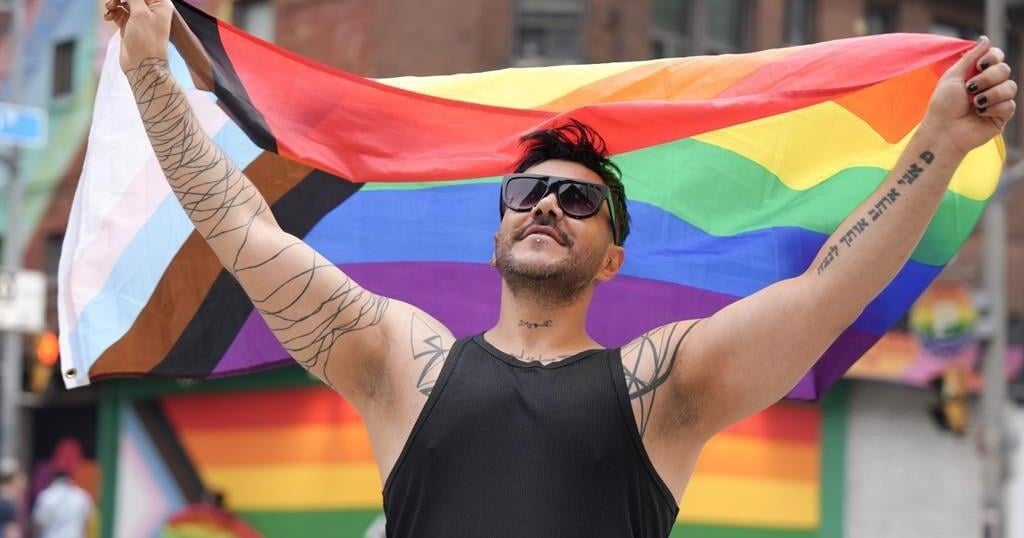TORONTO – When Zhya Aramiy was living in Turkey and Iraq, he had to keep his Pride flags hidden away.
Aramiy, who identifies as gay, fled from Iraq at the age of 27 after facing threats, physical violence and ostracization from his family because of his sexuality.
“I was at the point where I said, ‘I can’t stand it anymore,’” said Aramiy. “Either I have to lose my life here, just stay living this way, or I have to save my life … go somewhere safe.”
After living in Turkey for seven years as a refugee, Aramiy, now 35, relocated to Toronto last September. He said when he first visited the Church and Wellesley neighbourhood, known as the city’s Gay Village, it was the first time he had seen so many Pride flags out in the open.
“When I was going out on Church Street, I could see lots of rainbow flags, all over, around me, everywhere I could see,” Aramiy said.
“This I can say is the most beautiful moment, when I experienced it for the first time.”
Aramiy is among hundreds of LGBTQ+ newcomers to Canada who are celebrating their first Pride in Toronto this month, an event that some of them say is not only a celebration of identity, but also a symbol of hope and belonging after fleeing persecution.
The Canadian government says more than 70 countries criminalize consensual same-sex relations, including six countries that punish same-sex relations with the death penalty. A 2022 statement from the United Nations Human Rights Office notes that while accurate data on forcibly displaced LGBTQ+ people is lacking, they are among the most vulnerable of the 84 million forcibly displaced people worldwide.
Toronto’s first Newcomer’s Pride Parade was held earlier this month and more than 600 people participated, according to the African Centre for Refugees, one of the parade’s organizers.
Pride Toronto’s culminating parade this Sunday will feature many LGBTQ+ newcomers marching together, including Henry Bisaso.
The 27-year-old is celebrating his first Pride in Toronto after the African Centre for Refugees helped him relocate from Uganda last September. Bisaso said he had to leave the East African country after he and his boyfriend were targeted for harassment when photos of them were shared online.
“As an LGBT person in Uganda, you don’t have the freedom to really express your feelings,” Bisaso said. He added he feared he would lose his life, citing the country’s enactment last year of an anti-gay law that allows the death penalty.
Bisaso said that during his time in Toronto, he’s met other members of the LGBTQ+ newcomer community who “really give him courage.” Sunday’s parade is expected to feel like a big moment, he said.
“It’s gonna be a day where people celebrate Pride and you’re not scared of anything happening,” Bisaso said. “Because in Uganda, I’ve only been seeing this on TV.”
Latoya Nugent, the head of engagement for the Rainbow Railroad charity that supports LGBTQ+ people facing persecution in their country, said she has also built confidence after moving to Toronto from Jamaica in 2022.
Nugent said she faced discrimination in Jamaica as a queer woman. As an activist there, Nugent said she was once arrested after challenging “a culture that is very homophobic and queerphobic.”
“I experienced, especially after the arrest, a lot of fears and panic attacks, and so on. It just did not feel safe for me to peacefully walk the streets,” Nugent said. “Since I’ve relocated, I have been walking kilometres.”
Nugent said relocation can be life-changing for LGBTQ+ people, and those who leave their home countries often do so for a variety of reasons, such as unlawful detention, community rejection, violence and harassment. For her, coming to Canada made life “more colourful” and she now seeks to help others find the same acceptance.
“I now feel like I have a Canadian family, I have friends, I have a network of people I can call on … I can celebrate who I am, every day,” said Nugent.
Nugent added that challenges for LGBTQ+ newcomers don’t always end when they arrive in Canada. She said the country still has work to do to help those newcomers, such as supporting intersectional identities through inclusive spaces.
“When people relocate, although they feel like they can find community and find community that affirms queer identity, they also want to feel like their racial identity is affirmed,” she said.
Nugent also points to practical challenges for newcomers such as finding housing, which can be difficult if they don’t have financial history in Canada.
“It’s not enough for folks to feel like they’re OK, like their rights are protected. They still have to live and thrive here,” Nugent said.
For Aramiy, support for LGBTQ+ newcomers also means giving them confidence to believe in who they are and letting them know they belong. Part of that will be on display on Sunday, when he plans to march proudly in the Pride parade alongside his friends, celebrating their true selves.
“The feeling that I get here, it just makes me feel home,” said Aramiy. “It just makes me feel like all of these people around me, they are with me and they stand up with me, they support me.”
This report by The Canadian Press was first published June 29, 2024.
